A cube is floating in a liquid as shown in figure. Match the following.
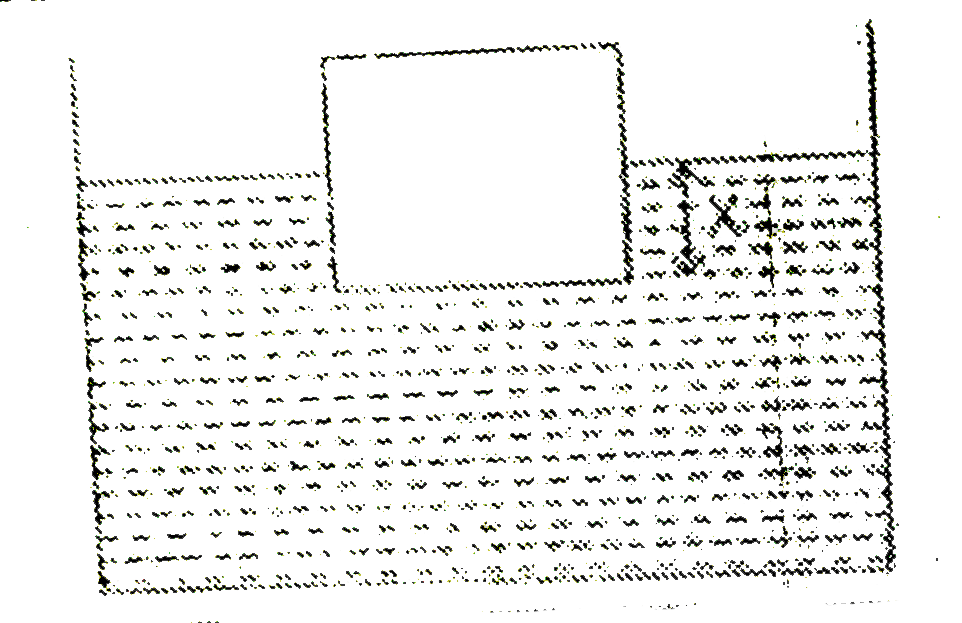
∣∣
∣
∣
∣
∣
∣
∣
∣
∣
∣∣Table-1Table-2(A)If density liquid(P)increasedecreases x will(B)If size of cube is(Q)decreaseincreased x will(C)If the whole system is(R)remain sameaccelerated upwards xwill∣∣
∣
∣
∣
∣
∣
∣
∣
∣
∣∣
The correct Answer is:A, B, C
Step by step video, text & image solution for A cube is floating in a liquid as shown in figure. Match the following. |{:(,"Table-1",,"Table-2"),((A),"If density liquid",(P),"increase"),(,"decreases x will",,),((B),"If size of cube is",(Q),"decrease"),(,"increased x will",,),((C),"If the whole system is",(R),"remain same"),(,"accelerated upwards x",,),(,"will",,):}| by Physics experts to help you in doubts & scoring excellent marks in Class 11 exams.
Updated on:21/07/2023Topper's Solved these Questions
- PROPERTIES OF MATTERBOOK - DC PANDEYCHAPTER - PROPERTIES OF MATTEREXERCISE - Integer
8 Videos
- PROPERTIES OF MATTERBOOK - DC PANDEYCHAPTER - PROPERTIES OF MATTEREXERCISE - Comprehension
32 Videos
- PROJECTILE MOTIONBOOK - DC PANDEYCHAPTER - PROJECTILE MOTIONEXERCISE - Level - 2 Subjective
10 Videos
- RAY OPTICSBOOK - DC PANDEYCHAPTER - RAY OPTICSEXERCISE - Integer type q.
15 Videos
Similar Questions
A cube is floating in liquid as shown in figure. Match the following columns.
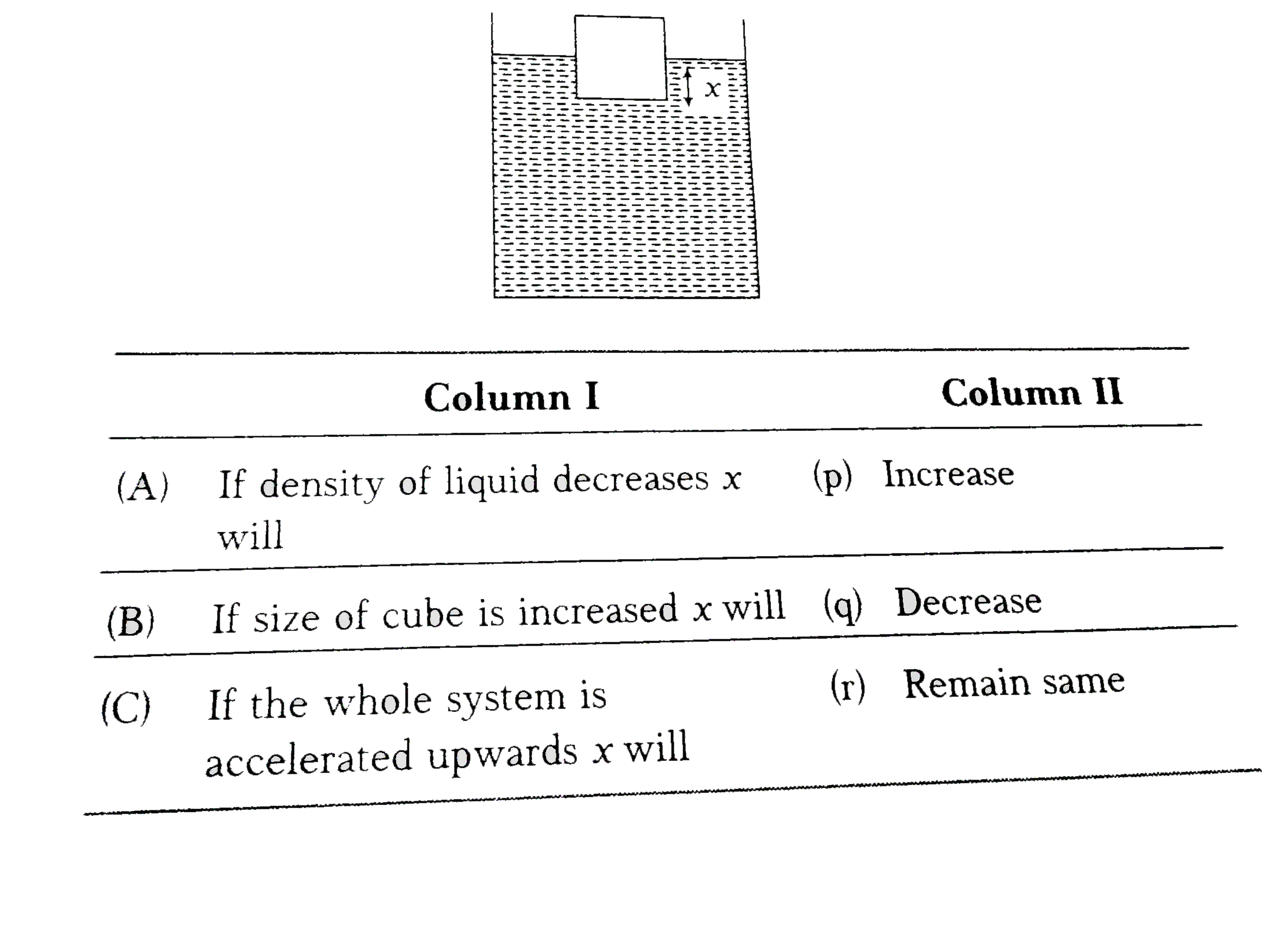
View SolutionTwo soap bubbles coalesce to form a single large drop. Match the following.
∣∣ ∣ ∣ ∣ ∣ ∣ ∣ ∣ ∣∣Table-1Table-2(A)Surface energy in the(P)increaseprocess will(B)Temperature of the(Q)decreasedrop will(C)Pressure inside the(R)remain samesoap bubble will∣∣ ∣ ∣ ∣ ∣ ∣ ∣ ∣ ∣∣
View SolutionThere are two point A and B inside a liquid as shown in figure. Now the vessel starts moving upwards with an acceleration a. Match the following.
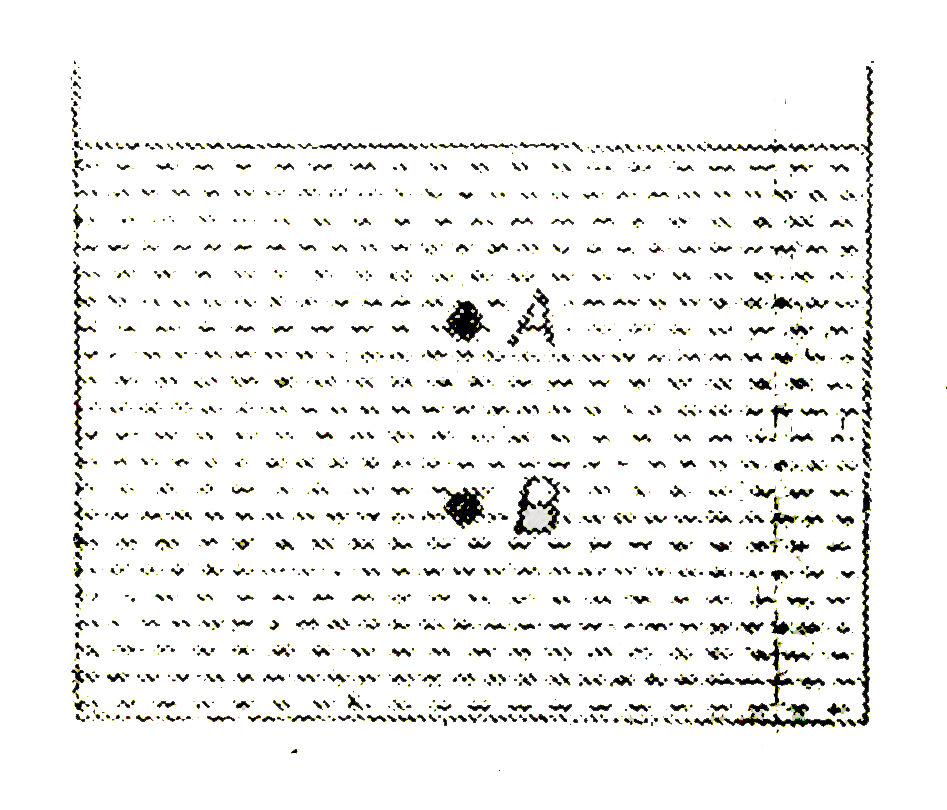
∣∣ ∣ ∣ ∣ ∣ ∣ ∣∣Table-1Table-2(A)Pressure at B will(P)increase(B)Pressure difference(Q)decreasebetween A and B will(C)Upthrust on an object(R)remain sameinside the verssel will∣∣ ∣ ∣ ∣ ∣ ∣ ∣∣
View SolutionA solid is immersed completely in a liquid. The temperature coefficients of volume expansion of solid and the liquid are γ1 and γ2(<γ1). If temperatures of both are increased, then match the following.
∣∣ ∣ ∣ ∣ ∣ ∣∣Table-1Table-2(A)upthrust on the solid will(P)increase(B)apparent weight of the solid will(Q)decrease(C)fraction of volume immersed in(R)remain samethe liquid if allowed to float will∣∣ ∣ ∣ ∣ ∣ ∣∣
View SolutionA tube is inverted in a mercury vessel as shown in figure. If pressure P is increased, then
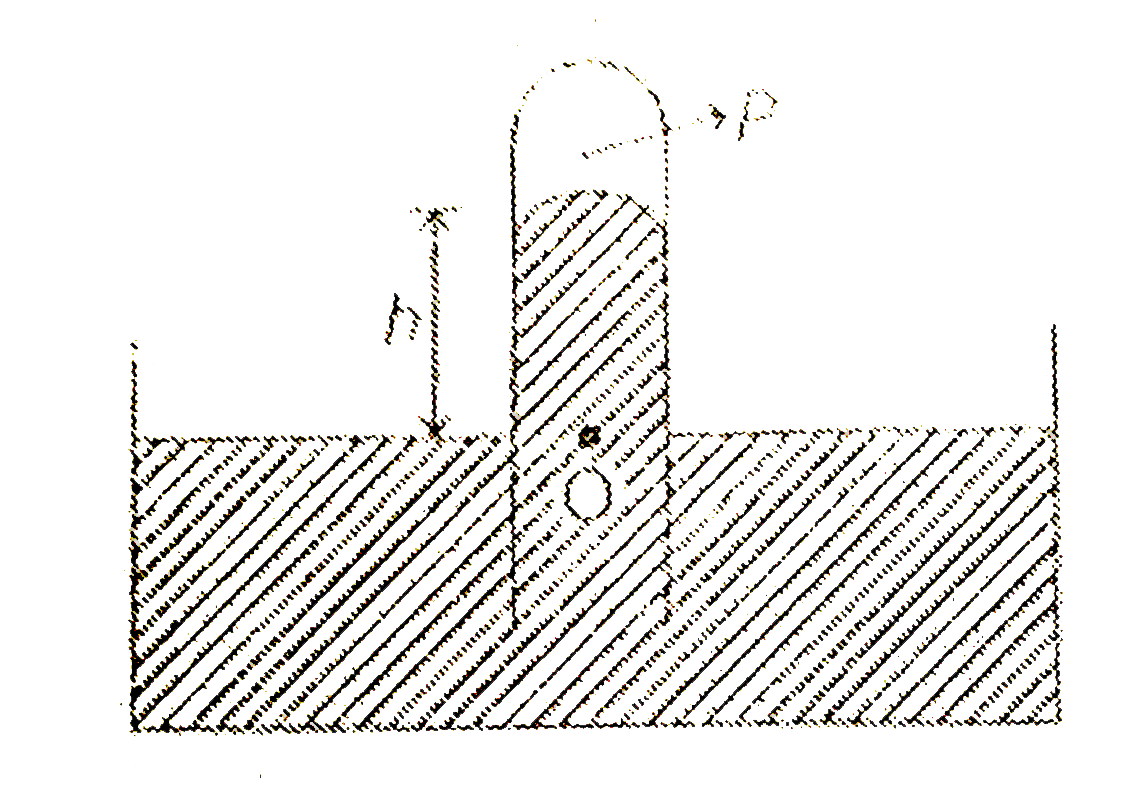
∣∣ ∣ ∣ ∣ ∣ ∣∣Table-1Table-2(A)Height h(P)will increase(B)Pressure at O(Q)will decrease(C)Pressure at 1 cm(R)will remain sameabove O∣∣ ∣ ∣ ∣ ∣ ∣∣
View SolutionIn the figures shown, match the following
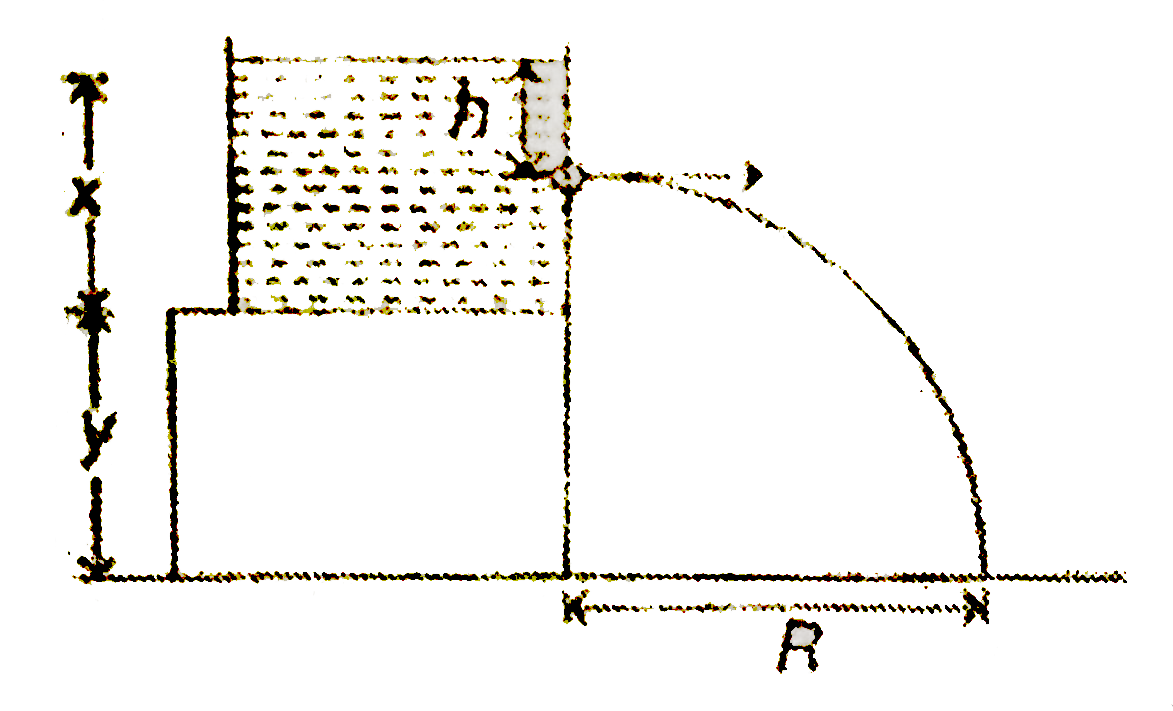
∣∣ ∣ ∣ ∣ ∣∣Table-1Table-2(A)x=2h, y=h(P)R=2√3h(B)x=h, y=3h(Q)R=2√2h(C)x=3h, y=h(R)R=2h∣∣ ∣ ∣ ∣ ∣∣
View SolutionIn the figure shown, velocity of liquid which comes out is v, time of liquid to fall to ground is t and range on ground is R. If the vessel is taken to a mountain, match the following.
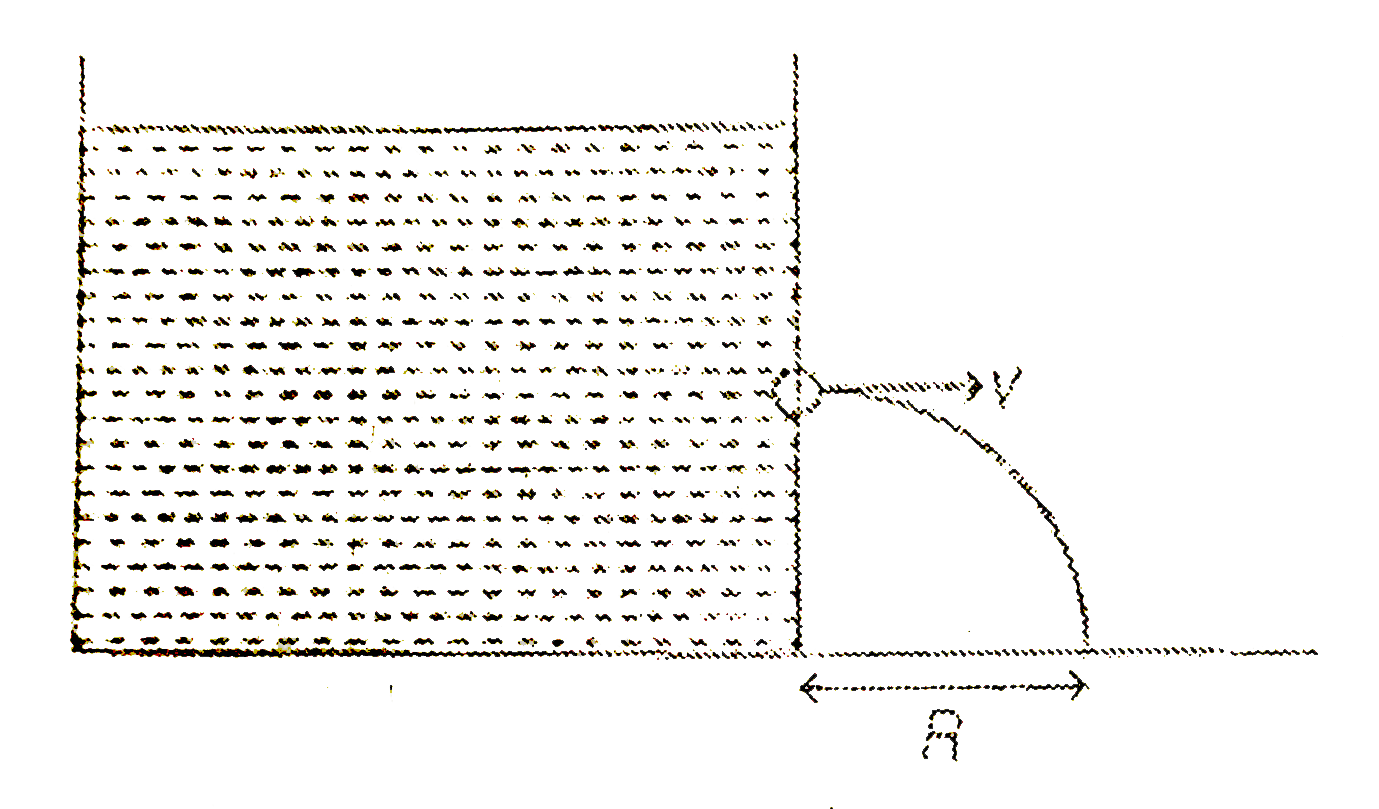
∣∣ ∣ ∣ ∣∣Table-1Table-2(A)V(P)will increase(B)t(Q)will decrease(C)R(R)will remain same∣∣ ∣ ∣ ∣∣
View SolutionMatch the following . When an independent positive charge moves from higher potential to lower potential, then
Table - 1Table - 2(A)its kinetic energy(P)will remain constant(B)its potential energy(Q)will decrease(C)its mechanical energy(R)will increase
View SolutionIf earth decreases its rotational speed. Match the following columns
Column-IColumn-II(A)Value of g at pole(p)Will remain same(B)Value of g at equator(q)Will increase(C)Distance of geostationary(r)Will decrease(D)Energy of geostationary satellite(s)Cannot say
View SolutionA particle is moving with speed v=2t2 on the circumference of a circle of radius R. Match the quantities given in Table-1 with corresponding results in Table-2
Table-1Table-2(A)Magnitude to tangential acceleration of particle(P)decreases with time(B)Magnitude of centripetal acceleration of particle(Q)increases with time(C)Magnitude of angular speed of particle with respect to centre of circle(R)remains constant(D)Angle between the total acceleration and centripetal acceleration of partilce(S)depends upon the value of radius R
View Solution
